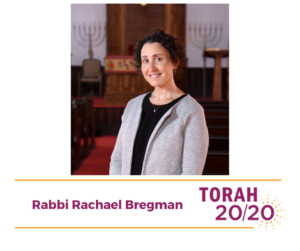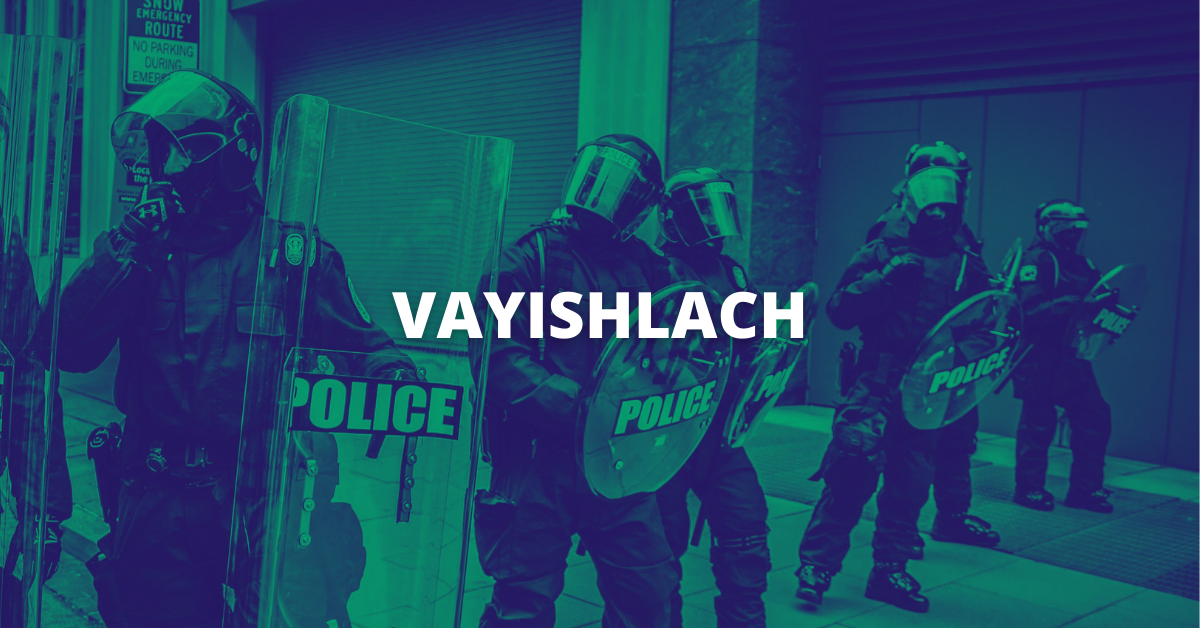A D’var Torah for Parshat Vayishlach by Rabbi Rachael Bregman
I live in the land where Trump and Biden signs face off from across property lines. We are told daily that our brothers, our neighbors, are a threat to our lives, are our enemies, because of how we vote. My “other” is not an abstraction, here in rural Glynn County, GA: They are the family across the street, with a bumper sticker on their car for a politician I do not like, who have also heroically rescued me on more than one occasion when my babysitter didn’t show and, as a solo mom, I had no one available to watch my kid. I love these people.
Today in the mail, I received three new 8×10 glossy print pages telling me how to vote to “Save America” in the January special election here in Georgia. The billboards around town inform me if I vote a certain way, it will mean the demise of our nation. Three different people have said that they have gone to purchase guns or ammunition but have failed because all of the many local stores are out of both. The men who murdered Ahmaud Arbery remain in jail after last week’s bail hearing, where more evidence of their racism emerged. I think often about Miss Wanda, Ahmaud Arbery’s mother, still living in a county that allowed hatred to seethe unchecked until it reached up and stole her son from her. Yet another clergy friend is losing their job for publicly speaking out against the racism which America is waking up to. After a messy process, our Confederate monument will be taken down and relocated. And everyone I speak to is deeply struggling.
Sign up to receive Torah 20/20 in your inbox each week.
We are called to seek peace and pursue it. But how?
Two weeks ago, in the Torah portion Toldot, we read of Rebecca having two nations wrestling in her womb. Thus, Jacob and Esau are introduced to the world. Is that not us right now? Two nations in one womb? The story evolves to show treachery, lying, best of intentions, well-meaning parents, hurt feelings, grabs for power. In the end, Jacob succeeds in acquiring the birthright and blessing from his father, along with his brother’s disdain. Jacob flees from Esau’s wrath and heads to Haran under the false pretense that he is looking for a wife. His life in Haran unfolds, but always in the background is this unresolved bitter conflict between brothers. And so here we are. This week in Vayishlach, meaning “Jacob sends a messenger,” Jacob and Esau must encounter one another on their journey. Jacob’s anxiety anticipating the encounter is palpable. He presents us with the question: When things have gotten really bad between brothers, how do we come back together?
In the Noam Elimelech, 18th century Chasidic Master Elimelech of Lizhensk explains that when Genesis says “Jacob sent messengers” it means he reconfigured the ordinary letters we use every day, turning them into words of prayer and of blessing in perfect love, and sent them. Because this is what one does in the pursuit of what is right.
We are taught in Judaism that we may do extraordinary things, things we may not otherwise do, mipnei darchei shalom, for the sake of the ways of peace — literally to turn one’s face in the direction of peace, or even wholeness. But the Noam Elimelech teaches us that the extraordinary comes from the ordinary. We take our regular words and rearrange them to do exceptional things.
In response to the shooting of Mr. Arbery, our county clergy, of all faiths and races, came together in solidarity and decided to keep going. We are deepening the bonds of collegiality, friendship, and brotherhood. This burgeoning clergy family is coming together to use old words in new ways. Here, we are learning the skills of Appreciative Inquiry paired with Asset Based Community Mapping under the leadership of Dr. Dietra Hawkins and Equity by Design. We are learning tools to change the conversation from debate to dialogue, from looking at problems to looking at solutions. We are learning to believe and to broadcast that we have and that we are enough. Dr. Hawkins has already been working with the county school system for the last several years. Now us. Next, we hope to include leadership from across the county to also learn, to also join us, faith-leaders of all stripes, in learning a new language of both speaking with and listening to one another. So far people seem receptive.
Find more commentaries on Vayishlach
Jacob and Esau have an uneasy first encounter. While there is no quick fix to building or repairing real relationships, these brothers model for us a beginning, not an ending. The ways of peace are paths traveled slowly. A new African-American minister friend regularly reminds me, “just keep your hand to the plough.” Truthfully, I have had some of the most breathtakingly hard and beautiful conversations through this project. I have learned so much and have so much more to learn. Privilege, bravery, humility. I could go on for days. And, I want you to know that this is doable, even if it is hard. It is slow work because the quick-fix mentality is a mark of the dominant cultural norms that real conversation seeks to disrupt. In the places where one has privilege, the need for patience and trust building is incredibly high. Show up. Show up again. We must engage in the work of repair, I am learning, with a commitment to not walk away from it. Ever.
 Let us let Jacob and Esau remind us: The words are here in our mouths. It is incumbent upon every being to use the ordinary words to do extraordinary things.
Let us let Jacob and Esau remind us: The words are here in our mouths. It is incumbent upon every being to use the ordinary words to do extraordinary things.
Rachael Bregman has been the Berman Family Rabbinate Rabbi at Temple Beth Tefilloh in Brunswick GA since 2013. She is the first woman to serve the community in this role. Rachael’s latest hobby is identifying pandemic blessings/silver linings within the challenges of this season in our lives.

